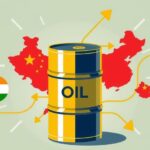Tesla Halts Orders in China for Imported Models Amid Trade War Tariffs
Tesla has stopped accepting orders for the Model S and Model X in China due to increased tariffs from the U.S.-China trade war. This decision affects Tesla’s competitive position in China, where demand for locally produced vehicles is rising. The company has cautioned about the effect of tariffs on American companies overall, and analysts express concerns over the brand’s declining reputation and demand challenges ahead.
Tesla has ceased taking orders in China for the Model S and Model X vehicles, both of which are imported from the United States. This decision appears to be a direct response to the increasing tariffs resulting from the trade war initiated by former President Donald Trump, which has significantly impacted the cost of imported goods. The company removed the order buttons from its Chinese website, replacing them with options to view available cars instead.
The escalating trade conflict has led to tariffs on China reaching 145%, while China imposed 125% tariffs on U.S. products. These border taxes have made U.S. imports less viable in the Chinese market, reducing the appeal of the Model S and Model X compared to locally-produced vehicles. Additionally, new orders for these models have been suspended on Tesla’s WeChat mini-program.
Since 2020, Tesla has been assembling its Model 3 and Model Y cars in Shanghai, mitigating some effects of the tariffs. Nonetheless, approximately 40% of their battery materials are sourced from Chinese suppliers, indicating that Tesla remains vulnerable to supply chain disruptions. As tensions rise, the company has attempted to diversify its sources for parts and materials.
Elon Musk’s affiliation with the Trump administration has placed him in a complicated position, having criticized tariffs while also advocating for significant budget cuts, leading to allegations of overreach. Musk voiced his opinion on tariffs, suggesting there should be zero tariffs between the EU and the U.S., contrasting sharply with the existing tariffs imposed during Trump’s tenure.
Recently, Tesla expressed concerns in a letter to the White House that tariffs could negatively affect U.S. companies. The company’s suspension of orders may have serious financial ramifications, particularly as it faces declining demand in Europe due to numerous factors, including competition from Chinese automakers such as BYD. Analysts have suggested that Musk’s political connections may have negatively impacted the company’s reputation, further exacerbating sales challenges.
Despite being valued at $812 billion as the most valuable car manufacturer globally, Tesla’s challenges continue. Equity analysts, including Dan Ives from Wedbush Securities, indicate that while the company is undervalued, it is experiencing a potential crisis and may benefit from Musk distancing himself from political affiliations. Tesla has not provided a public response regarding these developments.
In conclusion, Tesla’s halt in orders for the Model S and Model X in China is a significant consequence of escalating U.S.-China trade tensions and the imposed tariffs. This move reflects the complexities and challenges facing the company as it navigates international trade dynamics while attempting to adapt its business strategy in response to market pressures and competition. Furthermore, the implications of Musk’s political connections and the overall company valuation highlight a tumultuous period for Tesla as it confronts both external and internal challenges.
Original Source: www.theguardian.com






Post Comment